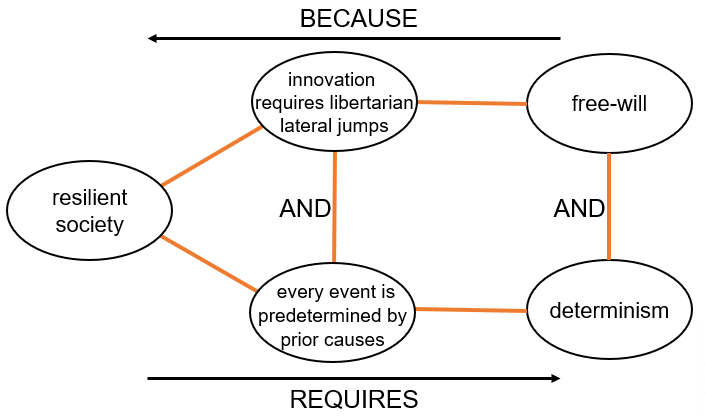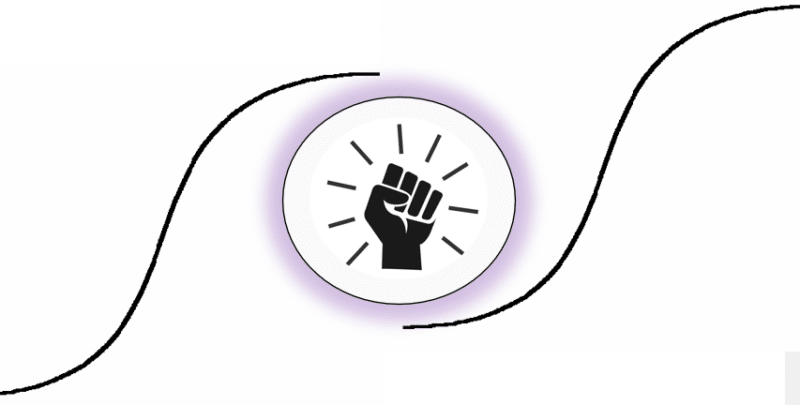Do humans possess free-will or not? Innovation-wise, we know, of course, that any question containing the word ‘or’ I automatically the wrong question, but nevertheless the question hasn’t stopped the philosophers of the world from going around in ever decreasing circles for the last couple of centuries. According to them ‘the’ answer depends on one’s philosophical, religious, or scientific beliefs. Here are a few perspectives:
Compatibilism: Some philosophers argue for a compatibilist perspective, suggesting that free will can coexist with determinism. In this view, even if the universe operates under deterministic principles, individuals can still have meaningful choices and control over their actions within the constraints of those deterministic forces.
Determinism: Others adhere to a deterministic view, asserting that every event, including human actions, is predetermined by prior causes. From this standpoint, free will is an illusion, as choices are ultimately the result of preceding factors. This standpoint singularly fails, however, to recognise that in any complex system any links between cause and effect are tenuous at best, and non-existent in a majority of cases.
Libertarianism: Libertarianism, in the philosophical sense, not to be confused with the political ideology, argues for a form of free will that is incompatible with determinism. It posits that individuals have the ability to make choices that are not wholly determined by external factors.
Neuroscience and Science: From a scientific standpoint, some argue that advances in neuroscience challenge the notion of free will. Brain processes and neural activity could be seen as determining factors in decision-making, suggesting that choices are, to some extent, a product of physical processes in the brain.
Existentialism: Existentialist philosophers, like Jean-Paul Sartre, embraced a radical form of free will. They argued that individuals are condemned to be free, meaning that we are responsible for our choices even in the absence of external determinants.
And then along comes WEF sock-puppet, Yuval Noah Harari, with the ‘thought’ that the ‘era of free will is over’. Thanks for that insight. Which, if I try and look at the statement without laughing is perhaps a piece of wishful neo-Marxist presuasion thinking. I don’t know. And I care less. Because, back to the original ‘to be or not to be’ question, the only meaningful answer is that the world needs both sides of the contradiction. Something like this:

What this bubble map in effect is trying to say is that we are all of us capable of exhibiting ‘free-will’. Watching my football team at the start of this season felt like a really good example of eleven players expressing their free-will by explicitly not doing what the, admittedly lost, manager told them to do. In a related vein, I could make a choice to swim across the Bristol Channel dressed in a doughnut-suit and singing The Beatles greatest hits in Danish. I’m pretty certain I’d be the first person in the world to think of this idea. The problem now is that I, like the Bradford City First XI, will quickly discover what most people instinctively understand: that most acts of free-will create outcomes that are worse than those that would have been achieved if we’d merely followed the well-established, ‘pre-determined’ success paths of those that had been there before us.
This is merely another way of paraphrasing Leo Tolstoy: every happy result of free-will is the same, each unhappy result of free-will is unsuccessful in its own way.
Free-will is what allows a person to break the established rules. The vast majority of broken rules – playing a 3-3-1-2-1 formation for example – deliver worse outcomes, but a tiny few end up giving the world the innovation it so desperately needs right now.
No free-will, no innovation.
Which I realise is what makes the removal of free-will so attractive to the WEF, perhaps the most un-inspiring, un-creative, un-impressive group of individuals ever to walk the Earth.
(Unless, of course, the whole thing is a massive double-bluff, and Klaus Schwab recognises that mankind will only solve its current problems if we can unite everyone against a common enemy. And that the only thing everyone on the planet can agree on right now is that we don’t want WEF looking after the future. In which case, I bow to their genius.)
Like it or not, the World throws Ordeals at us from time to time, and like it or not again, if we’re going to successfully complete the Hero’s Journeys necessary to overcome those Ordeals, it will be thanks to the blood-and-guts, rule-breaking, unchained free-will of the Hero.

